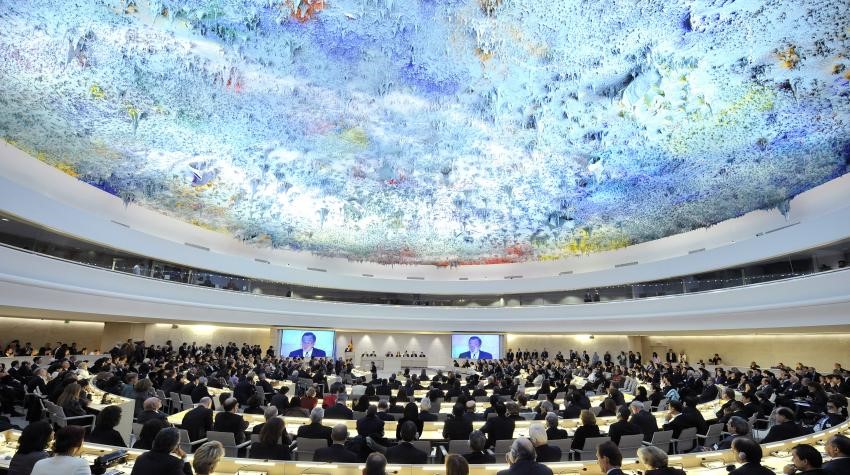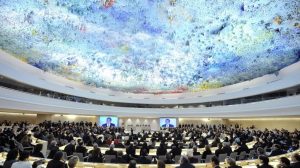Human rights, a term that is weirdly over-familiar to most of us; even out of its original context, sometimes hated, if misunderstood and sometimes celebrated, which is what exactly needs to happen. Retrospectively, in a world where power, influence and wealth are so unequally distributed and often flooded with useless wars and economic crises, no wonder that the above term is often mentioned in the media and society. So as a beginning, let us decrypt the word, Human rights.
According to UNOHCHR, Human rights are defined as “rights we have simply because we exist as human beings – they are not granted by any state. These universal rights are inherent to us all, regardless of nationality, sex, national or ethnic origin, color, religion, language, or any other status.” The definition itself might sound far too obvious and simple, but still there are plenty of instances where we do not even acknowledge that our rights are violated in the first place.
At first for some people, Human rights may feel like a fancy phenomenon which was “invented” by modern politicians to distract you from the governing forces. Honestly In my research for this article I encountered some opinions like that. But at its core, Human rights is a fundamental thing which was celebrated and influenced by many of the natural and manmade events of history.
Looking back at world history, the oldest proper archeological evidence of Human rights can be seen in the writings of the “Cyrus Cylinder” dated from 6th century BCE which was written by Persian emperor Cyrus the great which has mentioned the right to not being a slave, the right to worship one’s own religion and racial equality. Fast forward to medieval eras, the concept of natural rights and natural laws was widely traditionalized by some parts of the Catholic church even though the socioeconomic state of this time was not ideal for these concepts to be practically executed. As a prolonging to these ideas, the revolutionary “Magna Carta” charter papers were issued in 1215 by king John of England as a peace treaty between rebellious barons and unpopular monarchy. Many historians believe that this was the pioneering event of the current legislative aspect of Human rights. A couple hundred years later, in the era of Renaissance, intellectuals all over Europe began investigating the core values of humanity which elevated the importance of human rights via art, science and literature. Hence, the suppressed people in various countries started to fight against the oppression of their basic rights, which caused the events like French Revolution and American Revolutionary War.
These revolutions made the world appreciate the natural rights of people even more. Besides all of this almost every religion can be described as the examples for Humanities’ historical effort a make a society that respects the right to live without fear of all men and women.
Magna Carta Papers
Even though some particular rights can vary from one group of people to another, there are few basic forms of rights that are universal and should be respected universally. The United Nations’ Universal Declaration of Human rights is considered as the legislative document with its articles defining the general rights of the public. According to that a summary of the rights of humans are listed as follows; –
1. All human beings are born free and equal in dignity and rights.
2. Everyone is entitled to the rights set forth in the declaration despite their gender, race, religion or any other division or disparity and the governing bodies are bound to respect that civil right.
3. The most basic of human rights, everyone has the right to life, liberty and security of person.
4. No one shall be held in slavery or servitude.
5. No one shall be subjected to torture or to cruel, inhuman or degrading treatment or punishment.
6. Everyone has the right to recognition everywhere as a person before the law.
7. All are equal before the law and are entitled without any discrimination to equal protection of the law.
8. Everyone has the right to an effective remedy by the competent national tribunals for acts violating the fundamental rights granted him by the constitution or by law.
9. No one shall be subjected to arbitrary arrest, detention, or exile.
10. Everyone is entitled in full equality to a fair and public hearing by an independent and impartial tribunal, in the determination of his rights
11. Everyone charged with a penal offence has the right to be presumed innocent until proved guilty according to law and No one shall be held guilty of any penal offence on account of any act or omission which did not constitute a penal offence.
12. No one shall be subjected to arbitrary interference with his privacy, family, home or correspondence, nor to attacks upon his honor and reputation.
13. Everyone has the right to freedom of movement and residence under the conditions of international laws.
14. Everyone has the right to seek and to enjoy in other countries asylum from persecution.
15. Everyone has the right to a nationality.
16. Everyone of full age has the right to marry and the unit of family should be recognized as a fully liberal social construct by any law.
17. Everyone has the right to own property.
18. Everyone has the right to freedom of thought, conscience, and religion.
19. Everyone has the right to freedom of opinion and expression.
20. Everyone has the right to freedom of peaceful assembly
21. Everyone has the right to take part in the government of his country, and the will of the people shall be the basis of the authority of government.
22. Everyone, as a member of society, has the right to social security
23. Everyone has the right to work, to free choice of employment, to just and favourable conditions of work and to protection against unemployment.
24. Everyone has the right to rest and leisure.
25. Everyone has the right to a standard of living adequate for the health and well-being of himself and of his family.
26. Everyone has the right to access education
27. Everyone has the right freely to participate in the cultural life of the community.
28. Everyone is entitled to a social and international order in which the rights and freedoms set forth in this Declaration
29. While securing these rights, everyone has duties to the community which sets the limits and boundaries for the protection of each one’s rights.
30. Nothing in this Declaration may be interpreted as implying for any State, group, or person in the sake of violating the set forth rights.
Note that this is only a summary of all those rights which have a deeper and greater range of validation. Referring the UN website is recommended for a better understanding of the declaration in depth.
General Assembly of United Nations Human Rights Council in Geneva, Switzerland
However, while some of these rights may already be familiar to most of us thank to some awareness campaigns launched recently, in real world it is quite obvious that the majority of the public specially in our country are unaware of that they are entitled to have those rights. As a civilized society influenced by Buddhism and other peace-admiring religions, it is tragic to see the lives of people are spared in cold blood, and having higher rates of harassments against Women and Children which violate the most basic of the rights, the liberty to live safely. It is even disgusting to see the law being literally bent to protect some particular people while further suppressing already suppressed groups all around the world. Any person with a beating heart should feel that injustice unless they are biased with any agenda or power craze. But still, after all those years of preaching and examining, the world heavily suffers from the epidemy of violating human rights all over the world. All the war situations and the danger accompanied by them are live examples. In local context, when you think about it, even the struggle movement Sri Lanka faced in past months can also be explained as the aftermath of limitless oppression of Human rights and basic human needs. The corrupted societies where the rights of the public are not respected will always end up in a downward spiral as we “did NOT” learn from the history.
Apart from all the legal documents and limitless laws, much of the responsibility to secure everybody’s rights still remains in the hands of the general public, or us. It is again and again proven that laws alone cannot build a respected society. With millions of years of evolution, nature has gifted us with the most just and unbiased system to protect human rights, Sympathy. Trying to be in someone’s shoe in any situation can be the most effective way to judge and implement if his or her rights are being violated. With a little help of the consciousness and moral codes we developed with social norms and religions, it is not too hard to act and live in a way that no one get harmed or violated. But most importantly, as human beings we must be sympathetic enough and strong enough to protest and point out the situations where the rights of our family, our peers, our own people or even of strangers are violated.
By- Pramodya Karunasekara
Image Credits:
Content Image 1- https://bitly.ws/35cya
Content Image 2 and featured image- https://bitly.ws/35cyP
References:
https://www.ohchr.org/en/what-are-human-rights
https://www.un.org/en/about-us/universal-declaration-of-human-rights



